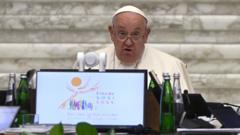A month-long synod held at the Vatican has culminated in a significant recommendation for the increased involvement of women in leadership roles within the Catholic Church. However, it notably did not propose the ordination of women as priests, an expectation some progressive participants had anticipated. This synod was part of a four-year process designed to incorporate the perspectives of Catholics globally, which included the participation of nearly 60 women among the 368 voting delegates.
During the event, delegates voted on a total of 151 proposals, all of which were approved by the necessary two-thirds majority. Nonetheless, the proposal concerning women taking on more leadership roles garnered the highest number of dissenting votes. At present, the Catholic Church maintains an all-male clergy and prohibits women from serving as deacons, a role that permits officiating baptisms, weddings, and funerals, but not celebrating Mass.
Amid hopes for progress, advocates for women's roles in the Church were left wanting after the final document stated that "there is no reason or impediment that should prevent women from carrying out leadership roles," but stopped short of endorsing their ordination. The final document also lacked specific references to the LGBT+ community, aside from an incidental note addressing those who feel marginalized due to their identities or marital status, leading to disappointment among more progressive factions.
Reverend James Martin, a notable American Jesuit priest and champion for the LGBT community, remarked that the outcome was not unexpected given the broader scope of the synod. Traditional advocates within the Church have expressed discontent with the synod from its inception, critiquing the inclusion of laypeople and the consultative approach as contrary to defining Church doctrine.
Pope Francis, now 87 years old, regarded the final text as a "gift" to the global Catholic populace of approximately 1.4 billion. His vision seeks a more inclusive dialogue where grassroots Catholics contribute to shaping the future direction of the Church, rather than solely relying on cardinals or bishops—a perspective that has drawn criticism from traditionalists throughout this consultative process.



















